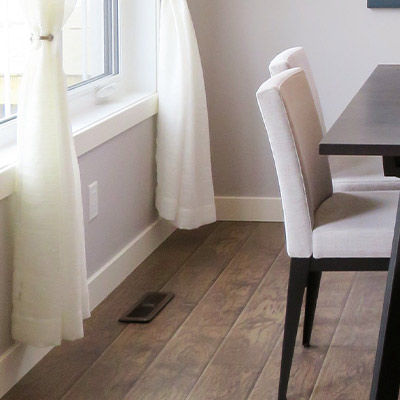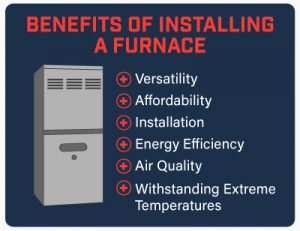
Does your Beaverton home rely on a boiler system to provide heat? Have you wondered if making a switch to a furnace might be better? Each heating system has its benefits and drawbacks. If you are looking for answers on which is best for you, a boiler or a furnace, our Beaverton HVAC contractors are here to help. Read on to learn which of the two heating systems provides the most significant energy efficiency, cost savings, and home comfort.
Our Beaverton Residential HVAC Installers Explain the Difference Between Furnaces & Boilers
If you’re curious about what residential heating and cooling solution is best for your Beaverton home, start by comparing the differences. Most homes are traditionally heated in two ways: furnaces and boilers. While they both are responsible for keeping your indoor climate comfortable, they function in very different ways:
- Heating Elements: Furnaces distribute heated air via ducts and grates. Boilers heat water and spread the hot steam throughout the home, typically via a radiator system.
- Air Conditioning Capabilities: Neither furnaces nor boilers can cool homes independently; however, furnaces can support central air conditioning because they utilize the same circulation, or duct, system.
Signs Your Boiler Might Need Replacement
If your boiler appears to be malfunctioning, it could be time to call experts in for residential HVAC maintenance. If you are unsure whether your boiler warrants replacement, here are some signs to look out for:
- Decreased energy efficiency
- Increased maintenance
- Inconsistent heating throughout the home
- Lack of heat, that’s not a result of a faulty thermostat
- Boiler shutting off unexpectedly
- Leaking water
Any of the above instances could mean your boiler requires repair or replacement. Our Beaverton HVAC contractors can diagnose any problems and recommend replacement solutions, like upgrading to a furnace that is right for you.
Is a Furnace Better Than a Boiler?
 Both furnaces and boilers have their benefits. Boilers tend to be quieter when operating than a furnace. However, boilers can only produce heat and often require more in the way of maintenance. If you are thinking about making a switch from a boiler, check out these six benefits to installing a furnace in your home:
Both furnaces and boilers have their benefits. Boilers tend to be quieter when operating than a furnace. However, boilers can only produce heat and often require more in the way of maintenance. If you are thinking about making a switch from a boiler, check out these six benefits to installing a furnace in your home:
1. Versatility
Residential furnaces can be powered by electricity, gas, oil, and propane. There are even new HVAC systems that allow furnaces to utilize solar and geothermal energy sources, which can go a long way to saving on energy costs. You can also find gas and oil-fired boilers; however, they tend to be more expensive than furnaces and can’t support air conditioning, meaning you will need a separate cooling solution for your home.
2. Affordability
Furnaces are more common than boiler systems, making them an affordable option. Because there are countless models at varying price points, homeowners can usually find a furnace that fits their residential needs and budget. They can also be more cost-effective to install and maintain than boilers.
3. Installation
Boilers require days for a complete installation. That could translate into higher labor expenses. On the other hand, our Beaverton HVAC installers can usually have a furnace connected in your home in just a few hours.
4. Energy Efficiency
Boilers are often considered extremely energy efficient. However, high-efficiency furnaces are readily available, which can help make utility bills easier to manage. Furthermore, furnaces can heat your home quickly when turned on. Boilers take considerably longer to warm a room, so they are often left on all day to maintain comfortable temperatures, which could drive up energy costs overall.
5. Air Quality
Because boilers don’t rely on forced air to operate, they are less likely to kick-up dust, allergens, and debris when heating your home. This can go a long way to maintain healthy indoor air quality (IAQ). Furnaces can circulate air pollutants; however, with high-quality air filtration and routine maintenance, you can dramatically lessen potential contaminants and achieve good IAQ.
6. Withstanding Extreme Temperatures
The elements can take a toll on your residential HVAC equipment. Frigid temperatures can cause liquid within your boiler to freeze, leading to frozen or burst pipes. Since single and two-stage furnaces rely on circulated air for home heating, you don’t run the risk of damaged pipes.
Looking for Residential HVAC Installation & Maintenance in Beaverton?
If you need advice on replacing your boiler system with a new furnace, contact our team of technicians at AAA Heating and Cooling. We offer recommendations on certified ENERGY STAR equipment, perform professional HVAC installation, and provide routine maintenance. If you experience a heating and cooling emergency, we can accommodate your needs with our 24-hour emergency care.